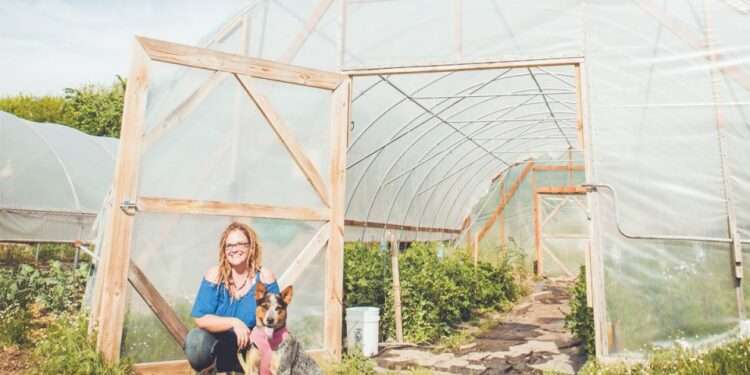Surrounded by tomato seedlings, purple carrots, and strange-looking peppers—whatever’s freshest at Theilen Produce Gardens—Kristy Theilen is a blonde-dreadlocked ambassador for a farm that has been in her family since the 1800s.
The cheerful 36-year-old and her veggies can be found at summertime farmers markets in the Omaha area, including Saturday in the Old Market and Sundays at the Florence Mill.
r r
r
Back in Schuyler, Nebraska, an old farmhouse anchors Theilen Produce Gardens’ home base. Kristy’s great-grandfather built the farmhouse in 1910, but it has been renovated and remodeled several times over the years.
Kristy and her mother both grew up in the home. After returning to Nebraska from Arizona in 2013, the two generations are back under one roof on the family’s 1,200-acre farm.
“When I was living in Phoenix, I came across a mask-maker who had mask-making traditions in their family for thousands of years,” Kristy says. “I thought about that—and how people in the city were surprised to hear I grew up on a farm—and got to thinking how important it is not to break that occupational chain. Farming has been on both sides of my family since forever.”
Her parents, Linda and Eldon, moved into the farmhouse in the late 1980s after they were married. “It used to be white wood panel siding,” says Linda, whose grandfather (John Bailey) built the home. Asbestos siding replaced the wood during her childhood; Eldon added the olive-green vinyl siding when they overhauled the structure.
Kristy’s older brother, his wife, and their children live on the other side of a creek, in a residence that previously housed their grandparents (near the original Bailey family homestead, which burned down and was rebuilt in the early 1900s).
r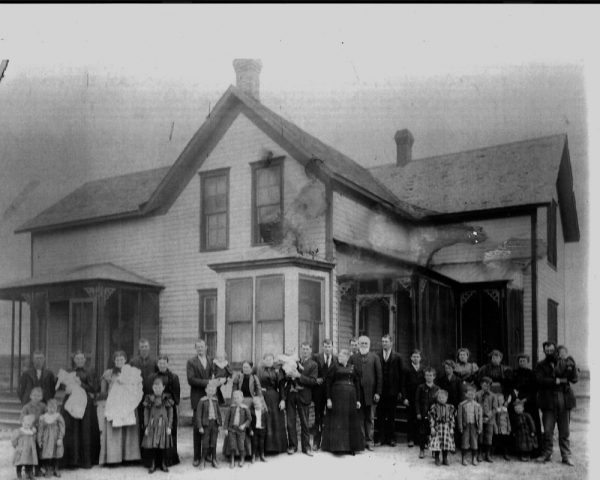 r
r
Her maternal ancestors in the Bailey family passed through Nebraska during a cross-country cattle drive to California in 1853. “We have a journal written by someone on the trip,” Linda says. “When they passed along the Platte River, they thought it was heaven, so they came back.”
After Linda’s father, Tom Bailey, assumed leadership of the family farm, he raised four kids in the old house. Linda was one of them. They farmed corn and alfalfa, and they sold eggs from Rhode Island red hens.
Eldon grew up on a farm north of Columbus. For the 33-some years since he and Linda took charge of the farm, they have continued the family’s agricultural tradition under their married name of Theilen.
At peak pork production, Eldon raised 3,000 hogs. Then, the market fell out just prior to the turn of the millennium. “There were so many hogs that packing houses couldn’t process them all,” Eldon says.
Today, they focus on corn and soybeans (but “mostly corn,” Eldon says). Kristy’s brother, Jeremy, helps manage the crops. Meanwhile, Kristy takes care of their smaller quantities of diversified livestock: chickens, goats, sheep, pigs, rabbits, and more. She is also in charge of the garden-fresh produce, starting seedlings in outdoor greenhouses (built by her father), and caring for the plant nursery. (The nursery was an addition to the home, also built by her father.)
r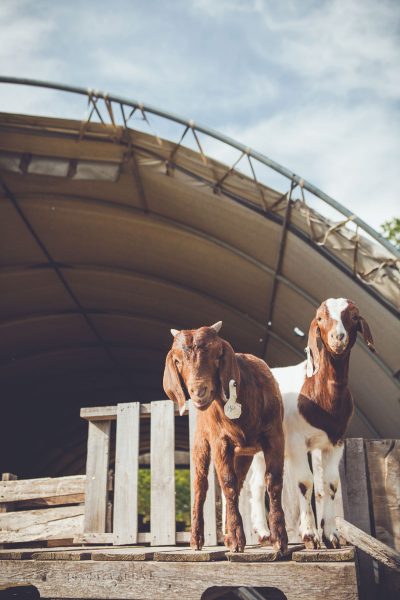 r
r
After a 10-month stint with the Peace Corps in Macedonia, three semesters studying abroad in Austria, and several years working as a community organizer in Phoenix and Tucson—including gardening in a vacant lot next to a Phoenix artist commune—Kristy returned to the family farm with the goal of implementing the latest sustainable agriculture trends.
Kristy and her fiancé, Fernando Castorena, have helped Theilen Produce Gardens expand into community-supported agriculture. Their CSA sells shares that entitle customers to receive weekly supplies of fresh produce and eggs, which are delivered in the Schuyler area and to farmers market pick-up points in Omaha.
“We were planning to be the world’s youngest snowbirds, but I didn’t want to leave my chores to my brother,” Kristy says, adding that 2017 was (almost) her first full year back in Nebraska, minus two months when they traveled to Arizona.
r r
“These new things are all Kristy’s doing. I think they’re great,” Linda says. “I think we need to be diversified in future years with grain prices the way they are.”
r
Other new initiatives that Kristy has developed include programs for kids and eco-tourism: Easter egg hunts, a Halloween pumpkin patch, hosting campers from the website Hipcamp, and welcoming boarders with the Worldwide Opportunities on Organic Farms (volunteers who work in exchange for room and board, also known as “WOOFers”).
During the Halloween pumpkin patch, Linda tells real-life horror stories of the criminals hanged at the old Colfax County courthouse. Her father (Tom Bailey) bought the old jail cell at an auction to protect irrigation pumps. Now, the jail cell is a historical relic tucked away in the back of their property.
r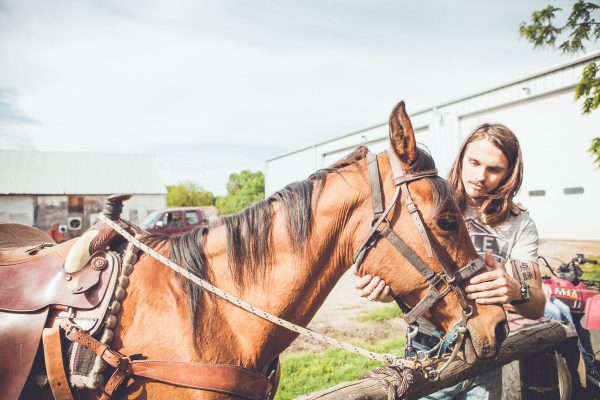 r
r
On the edge of bountiful cornfields, a tall signpost points to the farm’s various attractions: Shell Creek Path, corn maze, pumpkin patch, horses, animal barn, Bunnyville, and Coffee Quonset.
In Linda’s childhood, the “Coffee Quonset” was a storage barn for corn and machinery. She remembers playing on the piles of corn. Later, her husband built a new barn for the modern combine and larger machinery. The old barn was going under-utilized when Kristy suggested making a little shop for coffee and tea.
“These new things are all Kristy’s doing. I think they’re great,” Linda says. “I think we need to be diversified in future years with grain prices the way they are.”
Linda and Eldon tell the story of their land and farmhouse from a dining table, with a spread of fresh vegetables and hard-boiled eggs.
When they moved in, Eldon personally replaced all of the walls, installed new electrical wiring, added central air conditioning, and made subsequent upgrades to the home over the years.
Eldon has always encouraged his daughter to think outside of the box, because that’s how he looks at the world. He designed and constructed a “chicken tractor” that allows him to move chickens over cropland while replenishing nitrogen in the soil with their manure. Last year, he also hand-built their chicken “gypsy wagon,” a mobile hen house trailer.
Inside the house, he rearranged the floor plan of the traditional farmhouse. It’s now a four-bedroom home, with three bathrooms. The old master bedroom on the main floor became an office with the latest computer tech.
“In the ’80s, I had the first computer in Colfax County,” Eldon says. “I always try to stay on top of technological developments.”
Kristy’s fiancé has meanwhile brought crucial Latin cultural perspective and Spanish language skills to the family farm business.
Fernando grows vegetables common in traditional Mexican dishes—huitlacoche (a corn fungus that was a delicacy in Aztec cuisine), squash blossoms, and tomatillos—and he helps sell goats and other animals to local Spanish-speaking residents.
Before moving to the area, he didn’t know what to expect. But he was surprised by the large Hispanic population working in local agricultural industries and living in Schuyler and Fremont. He quickly found himself perfectly at ease in the rural Nebraskan setting, he says: “About 40 percent of our customers [who come to the farm] are Guatemalan or Mexican.”
Fernando’s dream is to launch a farm-to-table restaurant and/or food truck that could service the Schuyler area. His family works in the food industry in Phoenix, so he is confident that he could make it work.
The future is ripe with potential on the Theilen family farm. Who knows? Nebraska’s first farm-to-table Mexican restaurant might just sprout 75-minutes northwest of Omaha.
Kristy also has several other ideas for the future of the farm: expanding into wine production, hosting weddings, and growing their goat herd. “Wine, weddings, and goats, that’s my dream,” Kristy says with a laugh.
Visit theilenproduce.com for more information.
r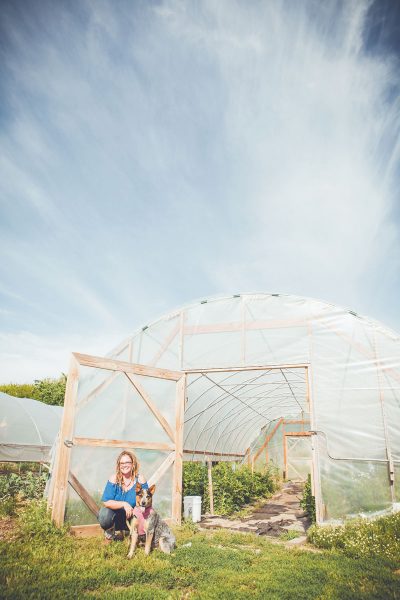
This article was printed in the July/August 2017 Edition of Omaha Home.


